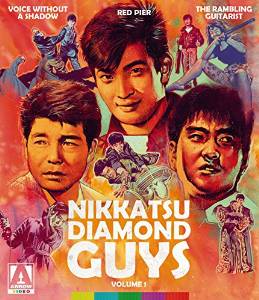
Nikkatsu Diamond Guys Vol 1
directed by Seijun Suzuki, Toshio Masuda and Buichi Saito
Nikkatsu, Arrow Films
To paraphrase the special features guy: “There are tons of great post war Japanese films that are never seen in the west.” I suspect that’s true, the classic film makers we all know are Akira Kurosawa and Takeshi Kitano, but there are many lesser known ones, including these guys (Seijun Suzuki, Toshio Masuda, Buichi Saito) who all worked at Nikkatsu Studios, and it’s good to see the Arrow Films guys bringing them back to life. This excellent Blu-ray comes with three full lengths along with a short 20 minute documentary on the Japanese studio system and the constraints they operated under. And while these films are all clearly Japanese from the settings to the motivations, they are also strongly influenced by the American gangster genre. No Kung Fu, no samurai swordsman, no pony tail hairstyles, no mystic levitating priest. Instead, these active and snappy flicks depends on guns, fisticuffs, molls, and amazing pompadour hairs styles to make their point. Let’s take a quick spin around the archipelago.
Voice without a Shadow (1958, Directed by Seijun Suzuki) focuses on a young telephone operator Asako (Yoko Minamida). She runs a switchboard and she accidentally overhears a murder. The police find nothing, and she settles into a married life. Too bad she married a guy in debt to the mob; he delivers his payola by losing at Mah Jong. It’s a shakedown, but a very social one. One of the players sounds awfully familiar to Asako and that propels a sequence of unfortunate events leading to death all around. Director Suzuki cleverly uses mirrors and reflection to build suspense, and we see a clean and neat Osaka packed with interesting film noir camera shots, a weird mix of Japanese and American signage, and thugs that look more rock and roll than Bugsy Siegel.
Red Pier (1958, Directed by Toshio Masuda) takes place on the Kobe waterfront; here we meet white-suited “Jiro the Lefty”(Yujiro Ishihara) who witnesses a staged accident and falls into the local criminal scene. He’s a natural talent as an assassin, and he has an oddly convivial relation with the police force. Pop-eyed Noror is assigned to the case, and even though he’s a bit of an onstage clown he’s also a ruthless investigator; eventually he corners Jiro who foolishly has fallen in love. In this film sunglasses are mandatory and we continue to see explicit American noir styling: Venetian blinds, long shadows, and glass block walls that look great in black and white. And Jiro is lovable; you know he’s a killer but a principled one: he never shoots civilians unless absolutely necessary.
In The Rambling Guitarist (1959, Directed by Buichi Saito) we meet Shinji Taki (Akira Koabyashi) out in the middle of nowhere hitching a ride on a hay wagon. He quickly ends up in the northern port of Hakodote. Turns out he’s an ex-cop turned assassin, and he he gets a mob job working for Akitsu (Nobuo Kaneko) where he falls for Yuki (Ruriko Asaoka), the daughter of one of Akitsu’s debtors who happens to be his brother. Well, THIS is a pickle – when his boss reposes his brother’s boat it places Taki in an awkward spot. Most women hate it when you kill their daddy and any more dates are going to be very formal. This film is in color, and some of the action surrounds the Blue Harbour Bar where it looks like Hermes Pan is choreographing the Japanese Cyd Charisse. The bar is the movie’s highlight; it’s an over-the-top 1960’s modernist cool joint. You’d happily pay $20 for a rock and rye if you found a place this cool in your home town. When we’re not in the bar or in the streets we spend a good amount of time at sea on a tender ship where Taki takes care of business using a weird system of gun duels. Sex, action, and transcultural weirdness: It all right here.
While you have to pay attention to the subtitles or learn Japanese (I voted for the subtitles) these are all action packed films with twists, gun battles and amazing hair styles. This collection holds up as well as any contemporary US post war gangster films, and are worth the time to explore.












